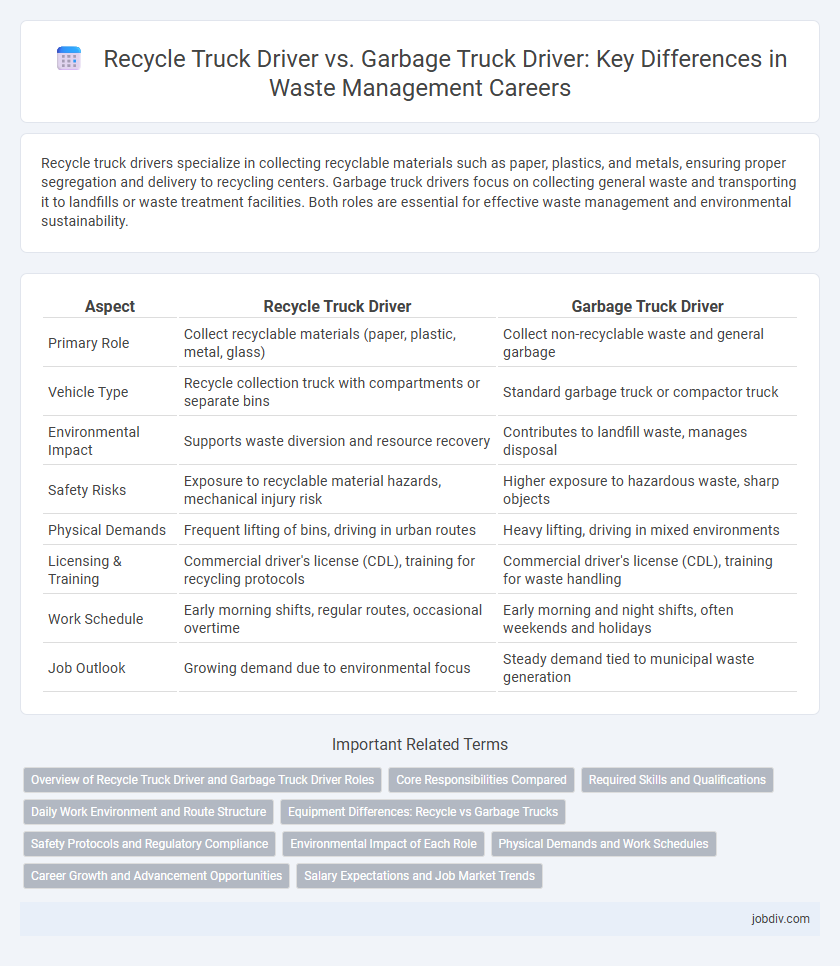Recycle truck drivers specialize in collecting recyclable materials such as paper, plastics, and metals, ensuring proper segregation and delivery to recycling centers. Garbage truck drivers focus on collecting general waste and transporting it to landfills or waste treatment facilities. Both roles are essential for effective waste management and environmental sustainability.
Table of Comparison
| Aspect | Recycle Truck Driver | Garbage Truck Driver |
|---|---|---|
| Primary Role | Collect recyclable materials (paper, plastic, metal, glass) | Collect non-recyclable waste and general garbage |
| Vehicle Type | Recycle collection truck with compartments or separate bins | Standard garbage truck or compactor truck |
| Environmental Impact | Supports waste diversion and resource recovery | Contributes to landfill waste, manages disposal |
| Safety Risks | Exposure to recyclable material hazards, mechanical injury risk | Higher exposure to hazardous waste, sharp objects |
| Physical Demands | Frequent lifting of bins, driving in urban routes | Heavy lifting, driving in mixed environments |
| Licensing & Training | Commercial driver's license (CDL), training for recycling protocols | Commercial driver's license (CDL), training for waste handling |
| Work Schedule | Early morning shifts, regular routes, occasional overtime | Early morning and night shifts, often weekends and holidays |
| Job Outlook | Growing demand due to environmental focus | Steady demand tied to municipal waste generation |
Overview of Recycle Truck Driver and Garbage Truck Driver Roles
Recycle truck drivers handle the collection of recyclable materials such as paper, plastic, and metals, requiring knowledge of sorting protocols to optimize recycling processes. Garbage truck drivers manage the collection and transportation of general waste to landfills or incineration facilities, prioritizing efficient route navigation and waste containment. Both roles demand safe operation of heavy vehicles and adherence to environmental regulations to support effective waste management systems.
Core Responsibilities Compared
Recycle truck drivers specialize in collecting recyclable materials such as paper, plastic, and glass, ensuring proper sorting and delivery to recycling facilities. Garbage truck drivers focus on collecting general waste, including household trash and non-recyclable items, transporting them to landfills or waste processing centers. Both roles require adherence to safety protocols and efficient route management to optimize waste collection operations.
Required Skills and Qualifications
Recycle truck drivers must possess knowledge of recyclable materials and sorting protocols, coupled with strong spatial awareness and manual dexterity for handling delicate items. Garbage truck drivers require proficiency in operating heavy machinery, familiarity with waste disposal regulations, and the physical stamina to manage heavy lifting and frequent stops. Both roles demand valid commercial driver's licenses (CDL), safety training, and excellent time management to ensure efficient route completion.
Daily Work Environment and Route Structure
Recycle truck drivers operate in cleaner environments, handling sorted recyclable materials with routes that often include frequent stops at residential and commercial recycling bins. Garbage truck drivers navigate more challenging conditions, managing unsorted waste that may include hazardous materials, with routes covering broader areas and fewer stops but heavier loads. Both roles demand adherence to safety protocols, but the daily work environment for recycle truck drivers tends to be less physically demanding and less odor-intensive compared to garbage truck drivers.
Equipment Differences: Recycle vs Garbage Trucks
Recycle truck drivers operate vehicles equipped with separate compartments designed to sort and transport recyclable materials such as paper, plastic, and glass efficiently. Garbage truck drivers use trucks with compactors that compress mixed waste to maximize load capacity for landfill disposal. These equipment differences reflect the distinct functions of handling sorted recyclables versus general waste collection.
Safety Protocols and Regulatory Compliance
Recycle truck drivers adhere to specialized safety protocols to handle recyclable materials, which often involve sorting and contamination prevention, requiring compliance with environmental regulations such as EPA guidelines. Garbage truck drivers follow rigorous safety measures to manage the collection and transportation of general waste, including adherence to OSHA standards for vehicle operation and hazardous material handling. Both roles demand strict regulatory compliance to minimize occupational hazards and ensure sustainable waste management practices.
Environmental Impact of Each Role
Recycle truck drivers contribute significantly to environmental sustainability by collecting recyclable materials that reduce landfill waste, conserve natural resources, and lower greenhouse gas emissions. Garbage truck drivers manage the removal of non-recyclable waste, which is essential for maintaining public health but often results in higher environmental impacts due to landfill use and incineration emissions. Both roles are critical in waste management systems, but recycling efforts directly support circular economy goals and long-term environmental preservation.
Physical Demands and Work Schedules
Recycle truck drivers face intense physical demands, frequently handling heavy bins and maneuvering bulky recyclable materials, which requires considerable strength and endurance. Garbage truck drivers endure repetitive lifting and prolonged periods of standing or climbing on truck steps, often under tight schedules to cover extensive routes. Both roles demand irregular, early morning, or late-night shifts, with garbage truck drivers typically working longer hours during peak waste collection seasons.
Career Growth and Advancement Opportunities
Recycle truck drivers often experience greater career growth due to the increasing demand for sustainable waste management and the expansion of recycling programs. Garbage truck drivers may have steady employment but face limited advancement opportunities, as the role is more routine and less specialized. Specializing as a recycle truck driver can lead to positions in environmental operations management and sustainability consulting.
Salary Expectations and Job Market Trends
Recycle truck drivers typically earn slightly higher salaries than garbage truck drivers, with average annual earnings ranging from $40,000 to $55,000 compared to the $35,000 to $50,000 range for garbage truck drivers. Job market trends indicate increasing demand for recycle truck drivers due to growing emphasis on sustainability and waste diversion programs, while garbage truck driver positions remain steady but face competition from automation technologies. Regional variations also affect salary expectations, with urban areas offering higher pay due to increased waste management needs.
Recycle Truck Driver vs Garbage Truck Driver Infographic

 jobdiv.com
jobdiv.com